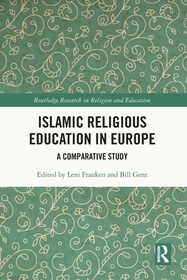
Islamic Religious Education in Europe
A Comparative Study
Series: Routledge Research in Religion and Education;
- Publisher's listprice GBP 37.99
-
18 149 Ft (17 285 Ft + 5% VAT)
The price is estimated because at the time of ordering we do not know what conversion rates will apply to HUF / product currency when the book arrives. In case HUF is weaker, the price increases slightly, in case HUF is stronger, the price goes lower slightly.
- Discount 20% (cc. 3 630 Ft off)
- Discounted price 14 519 Ft (13 828 Ft + 5% VAT)
Subcribe now and take benefit of a favourable price.
Subscribe
18 149 Ft

Availability
Estimated delivery time: In stock at the publisher, but not at Prospero's office. Delivery time approx. 3-5 weeks.
Not in stock at Prospero.
Why don't you give exact delivery time?
Delivery time is estimated on our previous experiences. We give estimations only, because we order from outside Hungary, and the delivery time mainly depends on how quickly the publisher supplies the book. Faster or slower deliveries both happen, but we do our best to supply as quickly as possible.
Product details:
- Edition number 1
- Publisher Routledge
- Date of Publication 9 January 2023
- ISBN 9780367748197
- Binding Paperback
- No. of pages328 pages
- Size 229x152 mm
- Weight 421 g
- Language English
- Illustrations 7 Illustrations, black & white; 7 Line drawings, black & white; 12 Tables, black & white 427
Categories
Short description:
Recognising the need for academic engagement around the challenges and benefits of effective Islamic Religious Education (IRE), this volume offers a comparative study of curricula, teaching materials, and teacher education in fourteen European countries, and explores local, national, and international complexities of contemporary IRE.
MoreLong description:
Against the backdrop of labour migration and the ongoing refugee crisis, the ways in which Islam is taught and engaged with in educational settings has become a major topic of contention in Europe. Recognising the need for academic engagement around the challenges and benefits of effective Islamic Religious Education (IRE), this volume offers a comparative study of curricula, teaching materials, and teacher education in fourteen European countries, and in doing so, explores local, national, and international complexities of contemporary IRE.
Considering the ways in which Islam is taught and represented in state schools, public Islamic schools, and non-confessional classes, Part One of this volume includes chapters which survey the varying degrees to which fourteen European States have adopted IRE into curricula, and considers the impacts of varied teaching models on Muslim populations. Moving beyond individual countries’ approaches to IRE, chapters in Part Two offer multi-disciplinary perspectives – from the hermeneutical-critical to the postcolonial – to address challenges posed by religious teachings on issues such as feminism, human rights, and citizenship, and the ways these are approached in European settings.
Given its multi-faceted approach, this book will be an indispensable resource for postgraduate students, scholars, stakeholders and policymakers working at the intersections of religion, education and policy on religious education.
MoreTable of Contents:
Islamic Religious Education in Europe: Introduction; Part I. Islamic Religious Education in Europe: Country Reports; 1. Islamic Religious Education in Austria; 2. Islamic Religious Education in Belgium; 3. Teaching ‘Religion – Islam’ in Bulgarian Public Schools; 4. Islamic Religious Education in Cypriot State Schools; 5. Education About Islam in Danish State Schools; 6. Islamic Religious Education in England; 7. Islamic Religious Education in Finland; 8. Islamic Religious Education in France; 9. Islamic Religious Education in German State Schools; 10. Islamic Religious Education and Teaching about Islam in Greece; 11. Islamic Education in the Netherlands; 12. Education About Islam in Norwegian Religious Education; 13. Islamic Religious Education and Education About Islam in Sweden; 14. Islamic Religious Education in Switzerland; Part II: Interdisciplinary Exploratory Essays on Islamic Religious Education in Europe; 15. Comparative Perspectives on IRE in Europe; 16. Islamic Religious Education in Europe and European Recommendations as Mutual Challenges; 17. Teaching and Learning About Islam in Educational Terms; 18. Varieties of Islamic Religious Education and the Link with Citizenship Education; 19. Democratic Education on Religion and Ethics in Islamic Religious Education Contexts; 20. Teaching About Islam: Insights from Hermeneutics; 21. Postcolonial and Feminist Perspectives in Islamic Religious Education; 22. Islamic Education within the Muslim Minority-Context of Europe: Pedagogy, Politics and Future Directions; 23. Religious Education and Social Cohesion: A Normative Stance; 24. Compulsory, Objective, Critical and Pluralistic Teaching about Religions? Incentives and Disincentives under International Human Rights Law; In Conclusion: Post-Secular ‘Islamic Religious Education’ in Europe – Challenges, Opportunities and Prospects; Index
More



